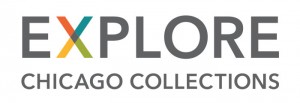If you are a history buff, an experienced researcher, or have even a mild interest in Chicago history and culture– drop everything you are doing and go to the Explore Chicago Collections website.
Have you done it yet? I’ll wait.
Now that you are up to speed, let the gushing begin. Explore Chicago Collections is the newly launched digital portal that connects hundreds of collections from various archives, museums, and cultural institutions from all over the city of Chicago. Broken down into general topics such as, ‘Events,’ ‘Government,’ ‘Daily Life,’ etc., anyone with an internet connection can easily find collections of interest to them, or even stumble upon something they did not know existed. The collections are also divided by neighborhoods, so anyone with an interest in their community’s history can easily access related collections. Neighborhoods are listed alphabetically for researchers’ ease and convenience.
Even better, the attractive and user friendly interface of the website allows for students and researchers of all skill levels to interact with the archival material of Chicago. From the main page, you can easily choose a general topic and narrow your research from there. For example, are you interested in learning how Chicago residents spent their recreational time in the old days? Great! By clicking on the “Recreation & Leisure” tab, a viewer can see every member institution’s collections pertaining to that topic in one place. From there, researchers can use various tags to refine their search, or simply use the “search” bar at the top of the page! Did I mention it was all in one place? It is all in one place. Plus, it’s free!!
This excellent website was made possible by a grant awarded by the Andrew W. Mellon Foundation to the University of Illinois at Chicago Library in partnership with Chicago Collections, the partnership organization comprising of all of the member institutions that make up the portal, ‘Explore Chicago Collections.’ Chicago Collections’ proclaims itself to be a “consortium of libraries, museums, and other institutions with archives that collaborate to preserve and share the history of the Chicago region.” To learn more about the initiative, click here.
At the moment, the Chicago Collections “consortium” is still growing. Eighteen members comprise the alliance, including such prominent institutions as the Chicago History Museum, the Art Institute, the Newberry Library, and of course Loyola University Chicago. It should be of no surprise that the Women and Leadership archives’ collections are featured on the Explore Chicago Collections website. Click here to see the WLA’s collections online. The promise of more institutions joining the collective is an exciting prospect for researchers of all ages and Chicago history lovers all over the country. As more institutions partner with Chicago Collections, more and more material will become known and accessed through the website. The age of scouring cities on the search for resource material for various projects is quickly and effectively disappearing.
Dear Chicago Collections, allow me to thank you on behalf of all harried and overly caffeinated graduate students frantically writing term papers and working on their dissertations. You are a lifesaver. I think I might cry.
Ellen is a Graduate Assistant at the WLA and is in the first year of her M.A in Public History at Loyola University Chicago. Before moving to Chicago, Ellen was a Kindergarten teacher in Louisiana. She enjoys brunch, procedural dramas, and pugs.
Loyola University Chicago’s Women and Leadership Archives Blog is designed to provide a positive environment for the Loyola community to discuss important issues and ideas. Differences of opinion are encouraged. We invite comments in response to posts and ask that you write in a civil and respectful manner. All comments will be screened for tone and content and must include the first and last name of the author and a valid email address. The appearance of comments on the blog does not imply the University’s endorsement or acceptance of views expressed.

